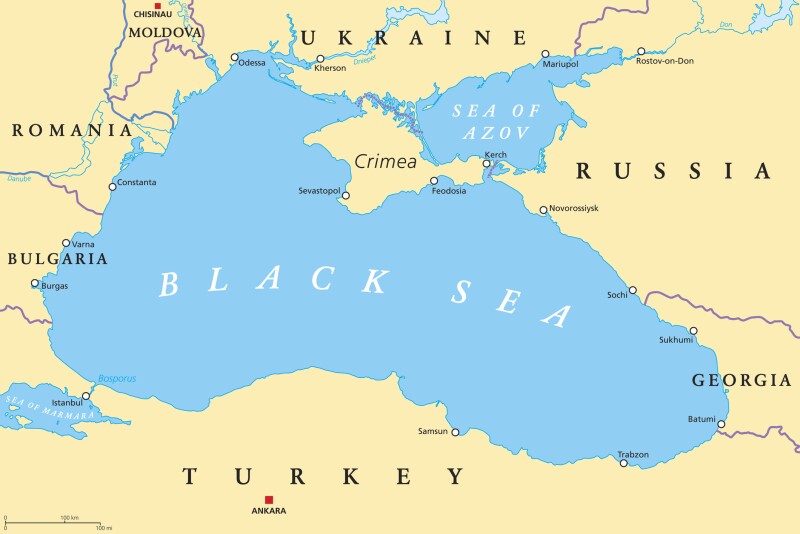Now that the Russian-Ukrainian war has entered its second year, it is apparent global natural gas flows have been distinctly reshuffled, leading to supply squeezes and shortages, as Europe pronouncedly witnessed in 2022. In this backdrop, the offshore sector is emerging as a critical realm to counteract gas shortages. Thus, it should not be surprising that the Black Sea's offshore sector is in the limelight via Turkey. The nation is now a deepwater gas producer via the Sakarya gas field (discovered in 2020); it is believed to hold the Black Sea's largest gas reserves as per various sources. Meanwhile, Romania is shoring up its offshore production after acquiring ExxonMobil’s deepwater discovery at Domino-1 (located in the Black Sea).
To be clear, the race to extract offshore gas extends globally and across geopolitical boundaries as a direct result of gas squeezes. Case in point: Despite the US placing sanctions on Venezuela, the US is embarking on making exemptions to allow Trinidad and Tobago (T&T) to import gas from Venezuela's offshore sector. T&T's Energy Minister, Honorable Stuart Young, since 2022 has focused on augmenting its gas feedstock, as the Caribbean nation has LNG exporting capabilities, previously outlined in the Journal of Petroleum Technology. Importantly, should the Russian-Ukrainian conflict persist during the 2023–2024 winter months, this will amplify the world’s need for gas supplies—a catalyst for gas projects.
Therefore, it is not surprising that the Turkish government had its own need to swiftly reach first gas via an aggressive discovery-to-production timeframe for a deepwater development for domestic purposes. Turkey imports 99% of its gas, raising the impetus to advance developing Sakarya. In light of this, Russia is eyeing Turkey as a potential regional partner with whom it can establish a hub to export its geopolitically stranded gas (to be outlined further in an ensuing section). It is not surprising that Alexander Novak, Russia’s deputy prime minister (one of the architects of OPEC+), revealed in March the dynamics of the ongoing war led to a reduction in gas exports by 25.1% in 2022.
This article will delve deeper into the evolving significance of the Black Sea, both regionally and globally. After all, the Black Sea is where Turkey shares maritime borders not only with Russia and Ukraine, but also with EU nations such as Romania.
Romania’s Offshore Advance
In 2019 Romania made a pivotal decision in the Black Sea, when the nation approved a $400 million final investment decision (FID) at Midia, which is located offshore. Ludovic Orban, Romania’s former prime minister—shortly after FID—delivered energy foresight for the region at the inauguration for Midia’s pipeline. Despite the EU's attempts to restrict gas project investment at the time, Orban referred to the pipeline as providing "energy security" for Europe.
The EU would come to further understand the significance of energy security when the Russian-Ukrainian conflict emerged, via the Nord Stream 2 underwater pipeline. Although it was nearing completion, Russia stalled its online operation, unlike Nord Stream 1, which was already producing (Nord Stream 1 and 2 are now dismantled, which severely impacted Europe securing gas in 2022). As the war in neighboring Ukraine flared up, Romania nevertheless began gas production from Midia, reaffirming its energy security stance.
Notably, apart from Midia, which is in shallow water, Romania has deepwater experience via the Neptun Deep block interest (adjacent to Turkey’s Sakarya gas field). It is there that the presence of gas was previously verified by ExxonMobil at the Domino-1 deepwater well. Since then, state-owned Romgaz (Romania’s largest gas producer)—purchased ExxonMobil’s interest. And just this month Neptun has reached FID to proceed with its development, amplifying the article’s thesis for the Black Sea.
It is vital to highlight that prior to FID being reached Bogdan Aurescu, Romania’s minister of foreign affairs, doubled down on the aforementioned, as he stated that the Neptun project "is a game changer for the region … [and we will] be able to help Moldova and other neighboring countries who are heavily dependent on Russian gas.” Romania generates over 90% of its indigenous gas, thus there is no pressing need for Russian gas imports. This, in turn, can bolster exports from Romania to neighboring nations if Neptun exceeds Romania's domestic gas requirements.
Russia’s Growing Interest in the Black Sea
Currently, Russia faces the problem of geopolitically stranded gas, which is further exacerbated by the dismantling of the Nord Stream underwater infrastructure and the reluctance of certain nations to engage in gas transactions with Russia. This raises the appeal of Russia to look for alternate routes to move its gas to other regions. For example, Russia already transports gas to Turkey and out to Europe via the TurkStream underwater pipeline. Said pipeline extends over 500 miles from Russia to Turkey across the Black Sea. Russia’s hub notion is still in its early phases; however, the war has showcased the level of geopolitical dynamism that can emerge from accelerating events and projects, meanwhile the Turkish hub is no exception. Germany's rapid completion of an LNG import facility supports the aforementioned statement.
In addition to TurkStream, a separate underwater pipeline known as Blue Stream connects Russia and Turkey, further demonstrating how Russia and Turkey have a joint interest in gas flows in the region. However, both TurkStream and Blue Stream's flows have previously been interrupted via shut-ins (for various reasons). Critically, Russia abruptly turned off the gas flows to Germany at the previously operational Nord Stream 1 pipeline (prior to its dismantling). A geopolitical tail-risk has been identified wherein the underwater pipelines from Russia to Turkey can be weaponized to enhance Russia's influence.
Global Reverberations and Black Sea Hydrocarbons
Turkey can potentially take inspiration from Romania's success by fostering its indigenous hydrocarbon production to bolster its energy security. Furthermore, if Turkey's reserves in the Black Sea prove to be the largest discovered with the inclusion of pronounced production, this can catalyze Turkey's transformation.
The article comes full circle, via T&T’s Caribbean neighbor—Guyana—which has illustrated the metamorphosis a nation can take in a few years via prolific hydrocarbon production. This phenomenon has the potential to be applied to Turkey and Romania. In the coming years, it will be critical to keep a close eye on the Black Sea and the effects it can have in the region and around the world.


